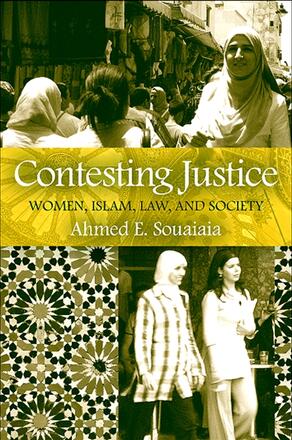
Contesting Justice
Women, Islam, Law, and Society
Alternative formats available from:
Argues that the rights of women in Muslim society are based on the preserved cultural standards of elites, not the ethical philosophy of the Quran.
Description
Contesting Justice examines the development of the laws and practices governing the status of women in Muslim society, particularly in terms of marriage, polygamy, inheritance, and property rights. Ahmed E. Souaiaia argues that such laws were not methodically derived from legal sources but rather are the preserved understanding and practices of the early ruling elite. Based on his quantitative, linguistic, and normative analyses of Quranic texts—and contrary to the established practice—the author shows that these texts sanction only monogamous marriages, guarantee only female heirs' shares, and do not prescribe an inheritance principle that awards males twice the shares of females. He critically explores the way religion is developed and then is transformed into a social control mechanism that transcends legal reform, gender-sensitive education, or radical modernization. To ameliorate the legal, political, and economic status of women in the Islamic world, Souaiaia recommends the strengthening of civil society institutions that will challenge wealth-engendered majoritism, curtail society-manufactured conformity, and bridle the absolute power of the state.
Ahmed E. Souaiaia is Assistant Professor of Religious Studies at the University of Iowa and the author of The Function of Orality in Islamic Law and Practices: Verbalizing Meaning.
Reviews
"…[Souaiaia's] ideas are illuminating … his examination of Qur'anic laws, particularly those concerning women, should resonate well in the international community. Moreover, he offers moderate Muslims a refreshing new approach to the sort of interpretations that have traditionally stifled women's advancement. " — Religion
"Contesting Justice may be appreciated from two points of view. It is, on the one hand, an advocacy piece, an original contribution to Islamic thought … But Justice also includes at least two chapters which, although part of the author's impassioned argument for a new view of Islamic law, also contain material that reveals much about the workings of the classical tradition … [Souaiaia] is surely an intellectual to watch on the North American Muslim scene. " — Studies in Religion
"Contesting Justice is in many ways a groundbreaking and pioneering study that links discourses pertaining to the nature, origins, development and the scope of Islamic law and practices with the concept of justice as it relates to the legal and economic status of women with special attention to the Islamic laws of polygamy and inheritance … Souaiaia's book is an extremely important study and a major contribution to the literature of Islamic law, legal theory, Islamic hermeneutics, as well as politics, women and gender studies and is recommended highly to all those interested in these disciplines. " — Middle East Studies Online Journal
"In Contesting Justice, Ahmed Souaiaia offers an innovative examination of the link between social justice and the Islamic interpretive and legal tradition … the author's efforts at combining a theoretical approach and practical methodology are commendable and very welcome efforts for scholars, students, and practitioners of Islamic law and human rights. " — Journal of Middle East Women's Studies
"There are numerous books published in the U. S. about Islamic law and women in the Muslim world. Many of those books are by people with no language skills, and little familiarity with original sources. Souaiaia has deep familiarity with the original sources in Arabic and Persian. He knows his sources firsthand, and does not treat the subject superficially … this book contains many important and original ideas about Islamic law and the interpretation and classification of texts. " — CHOICE
"This is the first study I have seen in which the author combines expert knowledge of highly technical aspects of shari`ah, Islamic hermeneutics, human rights, and social justice. Souaiaia speaks with authority to a specialist Islamic scholar, while making his argument and analysis clear and accessible to a general reader. This is an informative and engaging book. " — Abdullahi Ahmed An-Na'im, Emory University School of Law